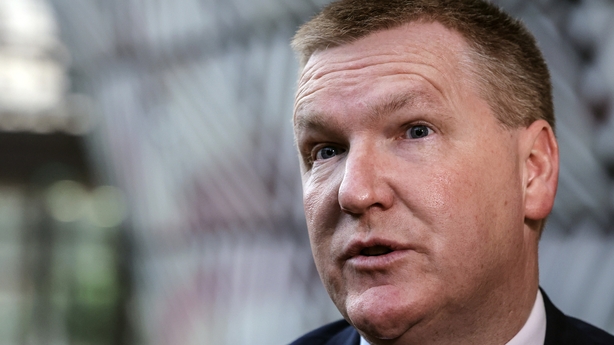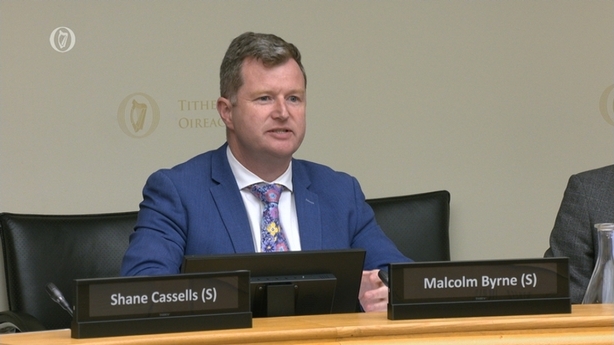Minister for Finance Michael McGrath is seeking a "proper assessment" of RTÉ's finances as he considers short and long-term funding options for the broadcaster ahead of the upcoming Budget.
"We need to have a proper assessment of what is the financial health of RTÉ at this point in time," Mr McGrath told RTÉ’s News at One.
"Last year I negotiated with Minister (Catherine) Martin and we extended an additional €15m (to RTÉ) by means of interim funding.
"We’re aware of the current trend in relation to the TV licence fee.
"We would encourage everyone to continue to pay the licence fee, to pay for the excellent content that RTÉ continues to deliver in terms of news, current affairs and live sport."
RTÉ has suffered another steep fall in TV licence revenue as figures show sales fell by nearly €900,000 in the second week of August, compared with the same week last year.
TV licence sales for the second week of August were 7,166 compared to 12,610 for the corresponding week in 2022 - a drop of 43%. The plunge in licence fee sales amounts to €871,000.
In total, TV licence revenue is down nearly €4.6 million since the broadcaster was engulfed in controversy over secret payments to presenter Ryan Tubridy.
RTÉ receives the vast majority of TV licence fee revenue at nearly 90% of sales.
Minister McGrath added: "The recent trend will have an impact and that will feed into the assessment that will conclude in the coming weeks and will be announced on Budget day.
"I anticipate that Minister (for Media) Catherine Martin will be engaged in negotiations with Minister (for Public Expenditure) Paschal Donohoe.
"In the next couple of months we will need to come to a view and a decision based on proper analysis about what interim funding is required for RTÉ to sustain public service broadcasting next year and into the future.
"More broadly the government will make a policy decision in relation to a longer term funding model for RTÉ and for public service broadcasting in general.
"We have a new media fund and we are determined to provide funding not just to RTÉ but to other media outlets that are providing good public content."

Speaking in Cork this morning Minister McGrath said the Government stands behind public service broadcasting and will continue to support it.
He said that some people who were no longer paying the TV licence fee have lost trust in the process, adding that it was up to the new leadership team at RTÉ to make up that trust.
"Reinstating that public trust and confidence is not an easy task and we support the director-general, his interim leadership team, in the work that they have to do, which is about rebuilding public trust," the minister said.
"The drop-off in the rate of payments on TV licences is not surprising, but it is disappointing, and for now that remains the vehicle through which we all need to support public service broadcasting.
"So it's important that we do continue to support it."
On a long-term funding model, Mr McGrath said it was "important" that RTÉ is not entirely funded through the exchequer, adding that if "the entire burden of funding fell on the shoulders of taxpayers through general taxation", it would be "a very different RTÉ".
'Fiddling while Rome burns'
Larry Bass, Chief Executive of film and TV production company ShinAwil, has accused politicians of "fiddling while Rome burns" with regard to the almost €5m decline in licence fee revenue, which is a significant source of funding for the independent sector.
Mr Bass told RTÉs News at One that Irish content will disappear if people refuse to pay the TV licence fee.
"You’re seeing death by a thousand cuts because there has been no increase for over 15 years," he said.
"No business can operate in a world where you have rampant inflation in the last couple of years and still expect to work on the same numbers as 15 years ago.
"At the height of the boom the independent sector was earning around €82m from RTÉ and providing lots of programming for the Irish public.
"Following the crash, the independent sector is down now to the mandatory legislated €40m that RTÉ must spend within the sector.
"That’s a collapse of over 50% of funding to the independent sector and it hasn’t come back since 2008.
"Politicians, continually kicking the can down the road, are the ones who are going to suffer most when there isn’t anyone watching public service broadcasting and we don’t have any debate about the body politic.
"They are fiddling why Rome burns."

'Do away with licence fee'
Fianna Fáil Senator Malcolm Byrne, a member of the Oireachtas Media Committee, has said that the TV licence fee should be dispensed with and replaced by a fund generated through general taxation.
Speaking on RTÉ's Drivetime he said: "It's my own view that we need to do away with the licence fee.
"We’re seeing dwindling numbers of people who are paying it.
"You should pay your licence fee, but this is going to be the problem the fact that there are fewer people paying it now.
"We also know that about 13% of houses don’t have the traditional TV set.
"We’re consuming content in a very different way, so we have to find a funding model for public sector broadcasting that matches the digital age.
"We have to find a funding model for public sector broadcasting.
"At present 7% of the licence fee is top sliced for the Sound and Vison Fund which was managed by the Broadcasting Authority of Ireland. Those functions have now been transferred over to the Media Commission.
"My view is we need to move to a situation where we publicly fund, from general taxation, public sector broadcasting.
"Government shouldn’t have a say in where it goes. It should be allocated through the Media Commission according to set criteria.
"There would be a block grant for RTÉ but there would also be competitive funding for which RTÉ, other broadcasters and local radio could compete.
"It needs to be at a level to be able to fund proper public service broadcasting in the 21st century."
'Self-inflicted' damage
Minister McGrath said RTÉ does not have an "easy job" to restore trust in the organisation after the "self-inflicted" damage done to its reputation.
"This was very much a self-inflicted own goal by RTÉ in recent months, and they have put their hands up and acknowledged that as an organisation they have been the cause of these problems, and that has undoubtedly undermined public confidence and public trust in the organisation," he told reporters in Cork.
Mr McGrath said RTÉ does provide "very high quality, public service broadcasting", and that he believes people "do appreciate the value of the output" by RTÉ.
Meanwhile, Dr Roddy Flynn, Associate Professor at the School of Communications at Dublin City University told RTÉ's Morning Ireland that there was no argument for retaining the TV licence and that it was a terrible way to fund broadcasting in the 21st century.
"It’s not sustainable, it’s not progressive, it’s left at the whim of Government ministers," he said
"It hasn’t gone up since 2008 when it’s supposed to go up with inflation."
Mr Flynn said that he would be stunned if RTÉ could continue to offer the same range of services, given the losses it is experiencing.
He added that RTÉ has a low budget per capita by European public service broadcasting standards and added that reliance upon commercial revenues muddies the waters of a public service remit.
With additional reporting by PA

